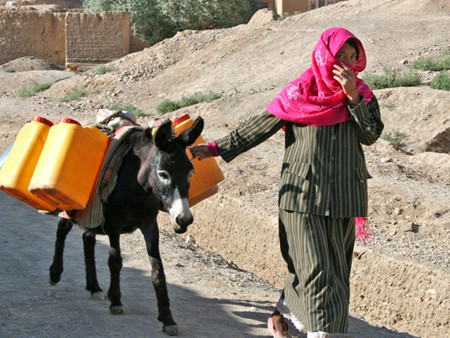
A woman on her way to fetch water in central Bamyan province, Afghanistan. Many returnees lack drinking water and have poor education facilities in their places of origin. (Photo: Mohammad Popal/IRIN)
Resettlement challenges in Afghanistan have discouraged refugees living in neighbouring countries from going home, with 60,000 returning in the past 10 months against 100,000 during the same period last year, officials said.
"The most important [reasons] relate to lack of opportunities for livelihoods and shelter, but also due to insecurity in some parts of the country," Nader Farhad, a spokesperson for the UN Refugee Agency, UNHCR, told IRIN in the capital, Kabul.
A lack of clinics, drinking water and poor education facilities in their places of origin were also among the reasons for the refugees not wanting to return, Farhad added.
Nearly three million registered Afghan refugees live across the region, including 1.7 million in Pakistan and one million in Iran. UNHCR is calling for international support to help returnees settle back in their homeland.
Since March 2002, 4.6 million Afghans have repatriated mainly from Pakistan and Iran under a UNHCR programme. This year's returnees include 43,000 from Pakistan and about 17,000 from Iran. But some say life has been tougher back home.
Abdul Shokoor, 35, and his six-member family, for example, lived in an abandoned kindergarten building with other returnee families in the eastern part of Kabul since returning from Pakistan last year under the UNHCR repatriation programme.
He went to his place of origin in Baghlan province, about 300km northeast of Kabul, but due to insecurity and lack of employment opportunities he had to return to the capital.
"I returned with a hope that my life would be better in my own country, but I was wrong," Shokoor told IRIN, adding that now he was standing every day near a roundabout seeking daily labour to earn enough money to buy some food for his children.
Under the UNHCR repatriation programme, which has entered its 10th year, every returnee receives US$150 upon arrival to cover their transport and some initial costs before settling back home.
Afghanistan's capacity to absorb more returnees is limited, therefore UNHCR is working with the government to ensure sustainable reintegration for those who have returned or will be returning in the future.
"UNHCR has initiated a transition solutions initiative with the governments of Afghanistan, Pakistan and Iran, whereby a multi-year strategy is being established for Afghan refugees in the region," said Farhad.
The strategy would be presented for endorsement by the international community at a high-level stakeholder conference early in 2012, he added.
"While the overall return figures have decreased markedly in comparison with the previous years of return, globally, Afghanistan remains one of the largest voluntary return operations," said Farhad.



